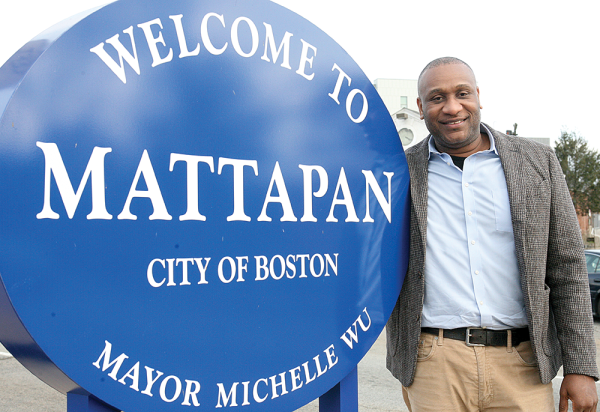January 11, 2024

Donald Alexis. Seth Daniel photo
Just months after cutting the ribbon on the successful Morton Station Village affordable housing project on the Dorchester/Mattapan line, Caribbean Integration Community Development (CICD) said it hopes that this year it will be able to launch a new model for dealing with the migrant housing crisis that is rocking the state and filling up hotels, hospitals, and airports throughout the region.
The issue of migrants crossing the southern border ballooned in 2023, and many of the Haitians who made their way to Boston arrived with nowhere to go in the short term and no housing in the offing for the long term.
CICD’s Donald Alexis said his organization has taken time away from working on its current pipeline of development projects to have its personnel address the migrant housing situation across its footprint – Mattapan – where many of the Haitian migrants first land looking for help.
“We’ve been talking about how to create a model at a scale that will make it worthwhile for everyone,” Alexis said last week. “This is going to require some federal money. Cities have been doing a lot of heavy lifting with their budgets and doing the best they can. The private capital community has to also help but the challenge is you need to create a model where there is a return for the money. We’ve been looking at a couple of sites around Mattapan, but the lack of capital has hindered us from moving.”
Right now, he said, CICD is hoping to launch a fundraising campaign in the next 30 to 45 days to get the idea of constructing a model off the ground locally. The group has identified the St. John’s & St. James parish in Roxbury as a mission-allied partner. He said the lift is a heavy one, and the pathway is uncertain, but CICD can’t watch from the sidelines.
“This is a subset of the population we wanted to serve from the get-go,” said Alexis. “Now we have an opportunity to do that work no matter if it’s hard or there is a lack of resources or some other problems. It’s something we have to do as an organization – take this step and fulfill this obligation.”
The ideal model would be to create short-term housing with resources, job training, and English classes on site by utilizing existing partners in the community. The housing would be tied to milestones of progress for those living there – learning English, graduating from a trade program are two examples – and then moving on to a next step. “We think [it will take] about nine months or ten months [for them] to get to a place where they can start feeling comfortable to live in a co-housing situation,” Alexis said. “We don’t believe this is housing someone comes to and stays forever.”
Right now, he said, all involved are doing their best, but having people living in church basements in Mattapan or being hosted by a family in the neighborhood isn’t going to produce the best outcomes. Likewise, the images of families living for weeks in the airport or at an area hospital – let alone stories about those who have been living in hotels for more than one year – are only going to create more burden.
“These are the Band-Aids on the problem. If I leave my home country…and make that ultimate choice to go to another country, it’s because I want something better for my family.”
Alexis believes that CICD can create the place to which people go when they first arrive and get a boost for their efforts to get on their feet as quickly as possible, move on from the property and become employed, independent, and contributing members of the community.
“If all of these people are working, buying things, and contributing to the economy, it could be a plus – especially when you hear about worker shortages everywhere you turn,” he said.



